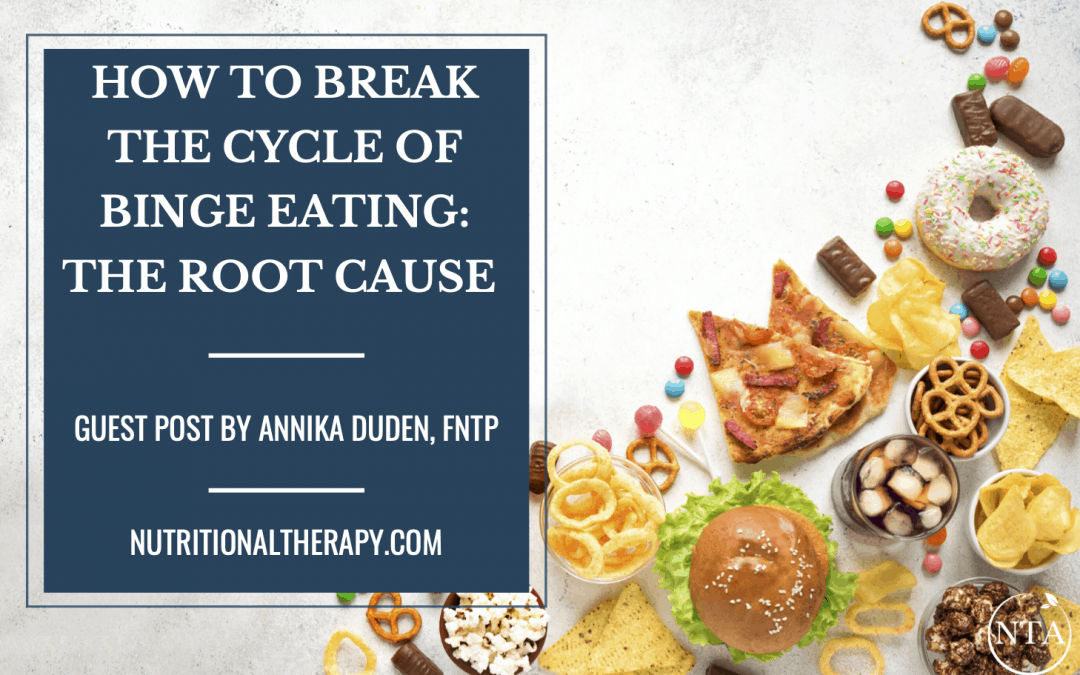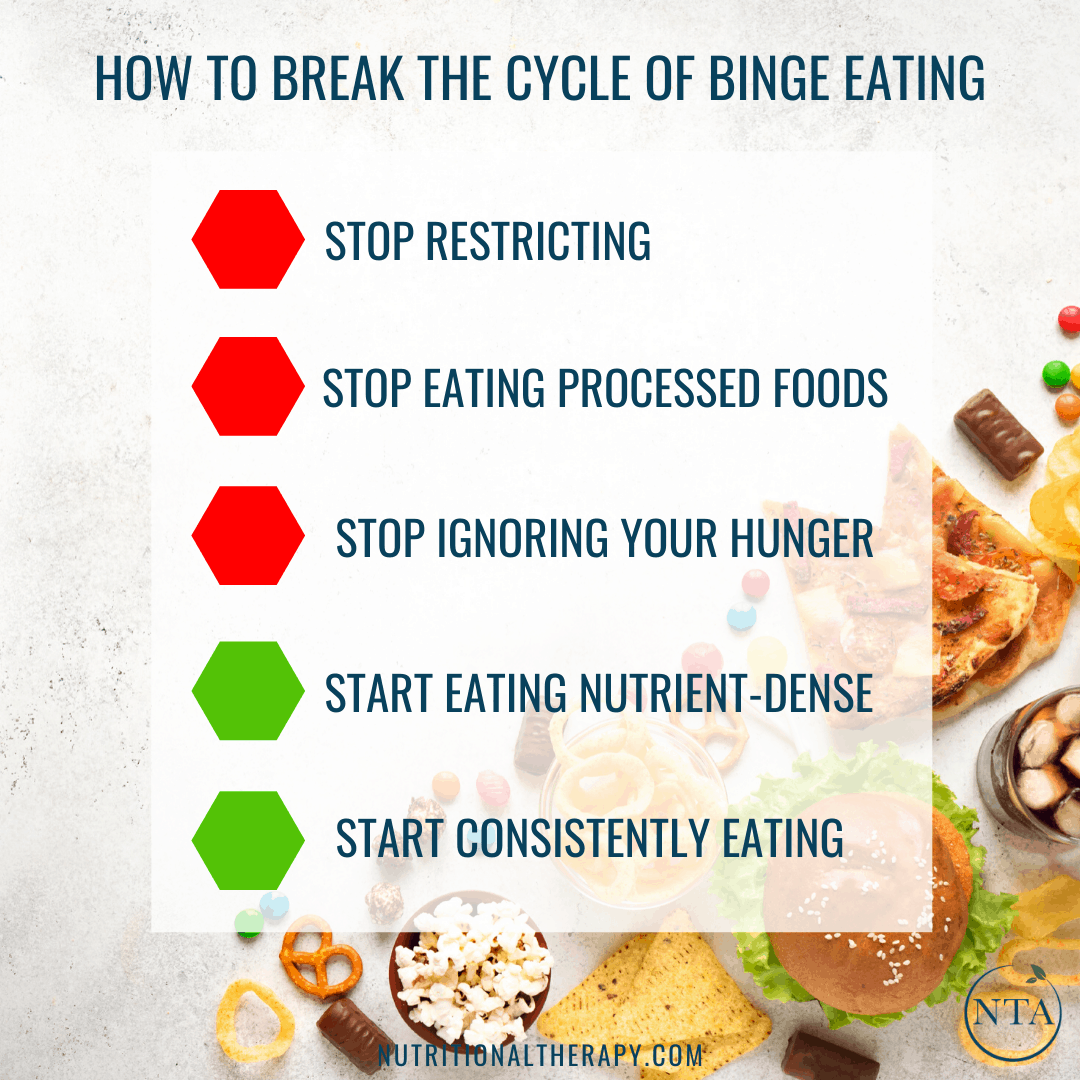
How to Break the Cycle of Binge Eating: The Root Cause
Blog
How to Break the Cycle of Binge Eating: The Root Cause
How to Break the Cycle of Binge Eating: The Root Cause is a Guest post written by graduate, Annika Duden, FNTP.
What is Binge Eating?
Binge eating begins with emotions, and transforms into the body’s cry for nourishment. Binge eating, or “uncontrollable” eating, is a common habit that can be associated with disordered eating. Many have struggled with this seemingly endless cycle of loss of control when it comes to food. Any person struggling with this unhealthy behavior may use similar words and phrases to describe how they feel:
- “In a trance”
- “I can’t stop even when I want to”
- “I never feel satisfied”
- “I’m scared to go home because I have _____ there, and I won’t be able to stop eating it”
- … and the list goes on.
It’s hard to understand this behavior, especially when it’s happening to you. Frustration and panic set in as you struggle to grasp the helplessness you feel when a binge overtakes you. Similar to other types of “binge” behaviors such as uncontrollable shopping, cleaning, etc., the root of each of these behaviors have two things in common: stress and deprivation. On an emotional level, a void exists that one is trying to fill. The binge that this person partakes in is their attempt to comfort themselves and feel fulfilled. Psychologically, it’s a principle that makes sense. When it comes to binge eating specifically, it can often times stem from an eating disorder. There are many forms of disordered eating that can cause this to arise in a person:
- Any form of food deprivation (extreme calorie counting, cutting out a macronutrient food group too aggressively, etc.)
- Eating disorders including anorexia, bulimia, orthorexia (fixation on a certain diet or way of eating/exercising), and more..
It has been stated that, “these factors, including stress, food restriction, the presence of palatable foods, and environmental conditioning, parallel many of the precursory circumstances leading to binge eating in individuals with bulimia nervosa and binge eating disorder.” (NCBI; Mathes, Brownley, Mo, & Bulik). However, I believe for each binger, there is a point in which the trigger of the binge shifts. At first, binges occur in order to fulfill a void caused by deprivation, restriction, sadness, or other powerful, negative emotions.
Then, in a moment, everything shifts. When the body has been deprived from calories or from certain foods for too long, it shifts into survival mode. Our body recognizes that it hasn’t been receiving adequate or even specific nutrients, and therefore takes over our brain and our actions in order to ensure its most basic need is being met: the need to be nourished and fulfilled on a caloric, macronutrient, and/or micronutrient level. Once this shift has occurred, we are stuck. Our bodies have transitioned into a state where they are demanding satiation at all costs.
There’s a reason why, the longer one binges, the more the binger feels trapped in this behavior and cannot escape. Binging is scary. It takes away our feeling of control, self-trust, and self-confidence. We often feel like a prisoner in our own bodies, and a slave to food. As daunting and confining as this feeling is, I believe full recovery is possible, because it truly comes down to science.
How to Overcome Binge Eating
As a former chronic binger, I have experienced all of these feelings. I have also experienced true healing and have now been binge-free for over two years. These are the five easy steps I’ve followed to control and ultimately end my binging:
- STOP all triggering forms of food restriction:
- Calorie counting, extreme fasting, limiting yourself to only certain foods and meals during certain times (no carbs during the week, for example) etc.
- STOP eating foods that are not serving you and that are keeping you in your binge cycle:
- Processed and packaged foods, fast foods, high-sugar foods, etc.
- These foods are fortified with chemicals, additives, preservatives, and are hyper-palatable (a fancy way for saying that they’re purposely made in a way to keep us addicted to their overwhelmingly delicious tastes and keep us craving more). Staying addicted to these foods will keep you in the vicious cycle of craving, restriction, and eventually, caving in, which leads to binging
- Foods containing high amounts of sugar are addictive (NCBI; Avena, Rada, Hoebel)
- STOP ignoring hunger signals, start to listen to your body, and begin to eat when you feel hungry:
- It’s also okay to eat if you’re just thinking about food. Eating in these moments assures your body that food is coming
- START eating fulfilling forms of the foods that you have been depriving yourself of:
- i.e. restricting yourself from french fries. Instead, make yourself homemade french fries or sweet potato fries
- START consistently eating:
- Rebuild trust with your body. Once you have reassured your body that food is coming, it will not trigger binges for you. If you are feeling full, satisfied, and not constantly starving, you will NOT be triggered to binge eat.

According to Rachael Link (MS, RD) healing and recovery is possible by stopping restriction and eating enough real foods. There is no doubt that this process will require emotional work. It’s also very likely that during the healing process, you will binge. Let it happen, and give yourself grace. By following the five steps outlined above, eating to satiety, replacing processed foods with real foods, and being gentle with yourself, you will recover from binge eating. It likely will not happen overnight, but one day you will wake up and realize that you didn’t binge yesterday. Then it will be one week, and eventually, it will be one year. Celebrate each of those milestones. It takes bravery and a constant commitment to yourself and to your health. You deserve that, and you can do it.
Sources:
- Avena, N. M., Rada, P., & Hoebel, B. G. (2008). Evidence for sugar addiction: behavioral and neurochemical effects of intermittent, excessive sugar intake. Neuroscience and biobehavioral reviews, 32(1), 20–39. https://doi.org/10.1016/j.neubiorev.2007.04.019
- Link, R. (2019, November 14). How To Overcome Binge Eating. Retrieved March 28, 2020, from https://www.healthline.com/nutrition/how-to-overcome-binge-eating
- Mathes, W. F., Brownley, K. A., Mo, X., & Bulik, C. M. (2009). The biology of binge eating. Appetite, 52(3), 545–553. https://doi.org/10.1016/j.appet.2009.03.005

The views and opinions expressed in this post are those of the author and do not necessarily reflect the views and opinions of the NTA. They are intended for general information purposes, and are not to be considered a substitute for medical advice, diagnosis, or treatment. Want your recipe or article to be featured on our blog? Email our team Marketing@nutritionaltherapy.com with your full name, article, a short bio in third person, and a headshot. We may feature you in an upcoming blog post.

Join us for a Live Webinar with one of our Instructors and Admissions Advisors!
During this call, you’ll explore and learn:
- How to create a rewarding career in holistic nutrition that will give you the confidence and competence to replace your full-time income (whether you’re new to nutrition or or using it to enhance your current services)
- How our unmatched education and instructor support sets our NTP program apart from other nutrition programs
- How graduates are successfully using their education and the many career opportunities available to you
- If the NTP program is the right fit for you and how to move forward in financing your education

